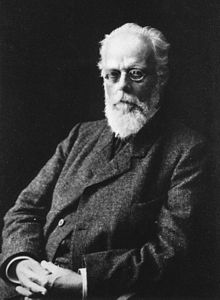
Back أوغست وايزمان Arabic اوجست وايزمان ARZ آوقوست وایسمان AZB Аўгуст Вейсман Byelorussian Август Вайсман Bulgarian August Weismann Catalan August Weismann Czech August Weismann German Άουγκουστ Βάισμαν Greek August Weismann Esperanto
August Weismann | |
|---|---|
 | |
| Born | 17 January 1834 Frankfurt am Main, Germany |
| Died | 5 November 1914 (aged 80) Freiburg, Germany |
| Alma mater | University of Göttingen |
| Known for | Germ plasm theory |
| Awards | Darwin–Wallace Medal (Silver, 1908) |
August Friedrich Leopold Weismann (17 January 1834 – 5 November 1914) was a German evolutionary biologist. Fellow German Ernst Mayr ranked him as the second most notable evolutionary theorist of the 19th century, after Charles Darwin. Weismann became the Director of the Zoological Institute and the first Professor of Zoology at Freiburg.
His main contribution involved germ plasm theory, at one time also known as Weismannism,[1] according to which inheritance (in a multicellular animal) only takes place by means of the germ cells—the gametes such as egg cells and sperm cells. Other cells of the body—somatic cells—do not function as agents of heredity. The effect is one-way: germ cells produce somatic cells and are not affected by anything the somatic cells learn or therefore any ability an individual acquires during its life. Genetic information cannot pass from soma to germ plasm and on to the next generation. Biologists refer to this concept as the Weismann barrier.[2] This idea, if true, rules out the inheritance of acquired characteristics as proposed by Jean-Baptiste Lamarck.[3] However, a careful reading of Weismann's work over the span of his entire career shows that he had more nuanced views, insisting, like Darwin, that a variable environment was necessary to cause variation in the hereditary material.[4]
The idea of the Weismann barrier is central to the modern synthesis of the early 20th century, though scholars do not express it today in the same terms. In Weismann's opinion the largely random process of mutation, which must occur in the gametes (or stem cells that make them) is the only source of change for natural selection to work on. Weismann became one of the first biologists to deny Lamarckism entirely.[5] Weismann's ideas preceded the rediscovery of Gregor Mendel's work, and though Weismann was cagey about accepting Mendelism, younger workers soon made the connection.
Weismann is much admired today. Ernst Mayr judged him to be the most important evolutionary thinker between Darwin and the evolutionary synthesis around 1930–1940, and "one of the great biologists of all time".[6]
- ^ Romanes, George John. An examination of Weismannism. The Open court publishing company in Chicago 1893 [1]
- ^ Germ-Plasm, a theory of heredity (1893)- Full online text. Esp.org. Retrieved on 2012-02-25.
- ^ Huxley, Julian 1942. Evolution, the modern synthesis. p. 17
- ^ Winther, Rasmus (2001). "August Weismann on Germ-Plasm Variation". Journal of the History of Biology. 34 (3): 517–555. doi:10.1023/A:1012950826540. PMID 11859887. S2CID 23808208.
- ^ Essays upon heredity (1889) Oxford Clarendon Press – Full online text. Esp.org. Retrieved on 2012-02-25.
- ^ Mayr, Ernst 1982. The growth of biological thought. Harvard. p. 698